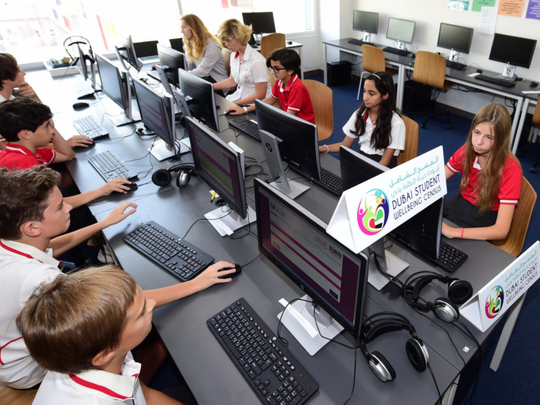
Dubai: For the first time, Dubai students are participating in a massive census about their welfare, the results of which will be used to improve their well-being, officials said on Monday.
The Dubai Student Wellbeing Census 2017, which started earlier this month, will be held every year for five years, polling 70,000 students in grades six to nine.
The first edition of the census will conclude in December and results are expected by January or February next year, officials said on Monday.
- Dr Abdullah Al Karam | Director-general of KHDA
Each school will receive its own results, which its management may choose to share with parents.
The census is organised by the Knowledge and Human Development Authority (KHDA) of Dubai in partnership with the Government of South Australia.
The KHDA will make recommendations to schools based on their census results.
Since the beginning of November, more than 10,000 students in 30 schools have taken the census, officials said. The census is meant for middle school students as they are likely to face more issues transitioning into adolescence, officials added.
On Monday, students at Swiss International Scientific School (SISD) in Dubai participated in the census, answering questions about their “social and emotional well-being/happiness, school relationships and engagement, physical health, lifestyle and after-school activities”.
The census is taken on computers in schools, and is anonymous — the answers cannot be traced back to individual students, whose details are kept separate from the responses. The census is also voluntary, with students free to back out before, during or after the survey.
Some examples of statements for students to agree or disagree with in the census include “I get along well with most of my teachers”, “I feel safe at school”.
On Monday, SISD students said they were both pleased and surprised to learn their feedback on their well-being was being sought by schools and education officials on such a scale.
During a visit to SISD, Dr Abdullah Al Karam, director-general of the KHDA, told reporters: “Happiness is a really serious business for us, we take it to heart, and we’re committed to do this for the next five years.”
Future editions of the census could involve teachers, parents, and school staff, he added.
The “diagnosis” on student well-being will help schools and officials focus on areas “that have a bigger impact” on student happiness and welfare, Dr Al Karam said.
“You’ll be surprised with the [census] results. I think kids are happy, generally. But they have never been asked about that before, not in the format of this census.”
Dr Al Karam said a main aim of the census was also to gather evidence for the line of thought that happiness leads to success in life — and not the other way around.
He also pointed out that a school’s census results would not be linked with KHDA inspections, which already include a parameter on student well-being, although not as detailed as the census. He added that in the years to come, a picture should emerge of a “direct correlation” between student happiness and school performance. The KHDA will, however, issue recommendations to the school based on census results.
On Monday, students at SISD told Gulf News that being social was important to their well-being. They were commenting in general terms about children their age, not specifically about themselves or their school.
Arianna Zeidi, 14, an American student in grade eight, said: “There are times when you want to spend time alone, yes, but I would like to see more people come together and be more social. You can be friends, but you can also be social with others and learn from each other.”
Dean Stankov, 14, a Bulgarian pupil in grade eight, said: “If this census helps schools listen to students, then well-being can be so much better than it already is … I think we spend too much time on electronic devices and I’ve seen people not communicating.”
What is it?
Students in Dubai schools are being asked to answer a variety of questions on their social, emotional well-being, school relationships and engagement, physical health, lifestyle and after-school activities.
What is the scale of the census?
70,000 students in grades six to nine are taking part. The census is running from the first week of November to the first week of December.
Are the responses private?
The census keeps student responses and their details, like names and grades, separate — answers cannot be traced back to students. It is also completely voluntary and students can back out anytime
When will the results come out?
The results for the 2017 edition are expected ending January or February next year.
Sample questions
In this school year, how often have you been bullied by other students in the following ways [physical, verbal, cyber-bullying]?
How often do you eat breakfast?
How often do you get a good night’s sleep?
If you do not participate in after-school activities, what is stopping you?












